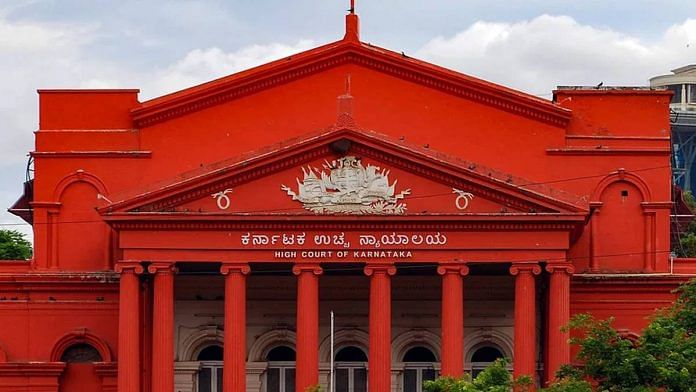New Delhi: The Karnataka High Court has commuted the death penalty awarded to a 70-year-old man to life imprisonment due to substantial delays in processing his mercy petition and illegal procedural lapses while keeping him in solitary confinement.
The division bench of justices G. Narendar and C.M. Poonacha was dealing with a 1988 case where one Saibanna had been accused of murder of his second wife while on bail in a case of murdering his first wife.
The death row convict, after being held guilty by a trial court, had appealed against the order in the HC and then to a third judge of the same court due to a split verdict. He had then approached the Supreme Court, the Governor, and finally, the President of India against the verdicts.
The President and Governor enjoy extraordinary powers of pardon and commutation under the Constitution of India. In 2013, though, the President of India had rejected Saibanna’s mercy petition, green-lighting his death penalty.
However, the Division Bench of the HC has now commuted the death sentence, holding that there was an unjustified and inordinate delay of more than seven years in deciding the petitioner’s case, causing him immense trauma. The court, on 17 August, also said that his solitary confinement was unlawful and that Saibanna had the right to get his life sentence commuted.
Saibanna’s trial under ‘non-existent’ IPC section
In 1988, Saibanna had confessed to the murder of his first wife before the police. While he was on bail, he married again and they had a child. Following this he was sentenced to life imprisonment for the murder of his first wife.
While he was on parole for one month, his second wife and child were found murdered, and Saibanna was found with five life-threatening injuries on his body.
Post this incident, one charge was brought forth under Section 303 (punishment for murder by life-convict) of the Indian Penal Code (IPC).
Section 303 was struck down by the SC because it was held to be unconstitutional. Despite the status of the provision, the trial of Saibanna under the “non-existent” section continued.
Advocate Ragini Ahuja, appearing for Saibanna, said this was a “classic case” of gross travesty of justice. She said that her client must be set free due to three supervening circumstances of delay, illegality, and procedural lapses.
Ahuja argued that there was an extensive delay of over seven years in the given situation, which led to the deprivation of her client’s rights. The court agreed with her, noting various instances where the mercy petition, forwarded to the State and Centre, did not see the light of the day.
“The schedule of events would demonstrate a clear lapse on the part of the state government and the Union government,” the court said.
For instance, the petition to the state government forwarded in May 2005 was not considered till January 2007 — a delay of almost two years where the case lay dormant.
The HC noted that there was “absolutely no explanation” why the mercy petition was not decided expeditiously and took note of various other instances where there was immense delay through functionaries, including the state government and the governor’s secretariat.
In forwarding the governor’s decision to the President, the charge sheet and split verdict were not forwarded, which the court said was a “procedural defect” in handling the mercy petition.
Yet again, there was an unexplained delay of over six years at the President’s secretariat between 2007 and 2013. During this time frame, the petitioner’s case was withdrawn and resubmitted multiple times to the President’s office, which the court took strong exception to.
“There is absolutely no rhyme or logic for the withdrawal and resubmission of the case summary,” the court observed.
Mental & physical effects of death row, inordinate delay
In light of these multiple procedural delays and lapses, the court said that a cumulative reading of the case indicates a total delay of almost eight years by the President and the governor’s office.
“The mercy petition has seriously prejudiced the rights of the petitioner”, the court said.
Noting an earlier decision of the apex court, the HC noted that the mental status of a death row convict is an eye-opener that has both a physical and mental impact on the rights of the accused.
It added that the effect of a delayed mercy petition on a prisoner had been observed in multiple cases. In the present case, the delay was an inordinate one that the state or central government could not explain.
The circumstances thus “inheres” (provided) a right to Saibanna to get his life sentence commuted, the Court said.
The court also examined the prison reports in Belagavi (Karnataka). It noted that the accused was kept in a single block in the Andheri Division.
The single block is like single-cell confinement and is often described as the detention block.
The court observed that the accused was made to suffer solitary confinement without the sanction of law. It noted various instances of trauma caused to the petitioner due to single-cell confinement, including dehydration, fear psychosis, etc.
The HC referred to a 2022 case involving an ex-cop where the court had commuted a death sentence due to solitary confinement’s ill effects. Saibanna’s case, too, the court said, was squarely covered by the observations in the 2022 case and the sentence must be commuted.
(Akshat Jain is a student at the National Law University, Delhi, and an intern with ThePrint)
(Edited by Zinnia Ray Chaudhuri)
Also read: HC upholds acquittal of Muslim man accused of minor wife’s rape — no intercourse ‘before marriage’



